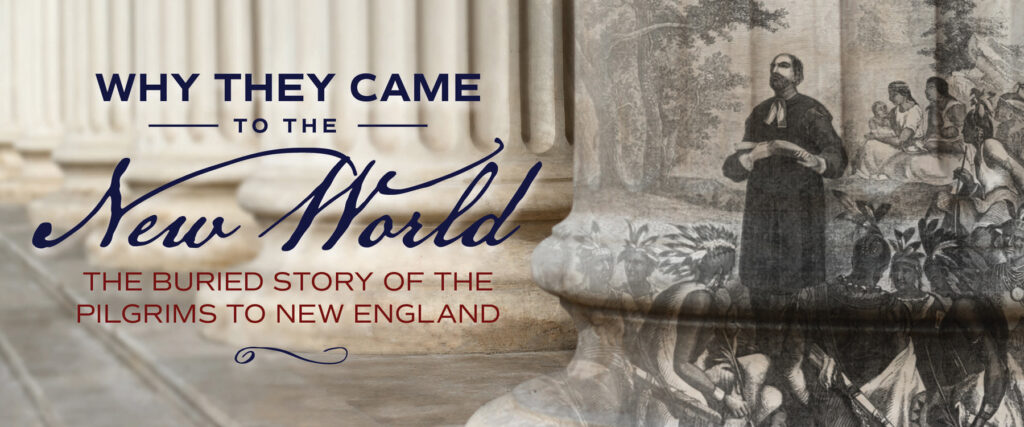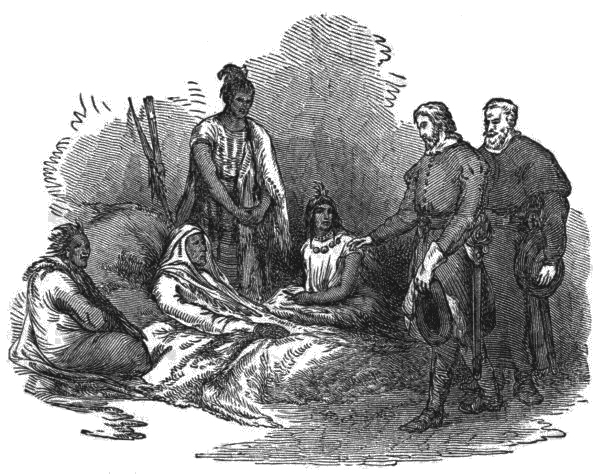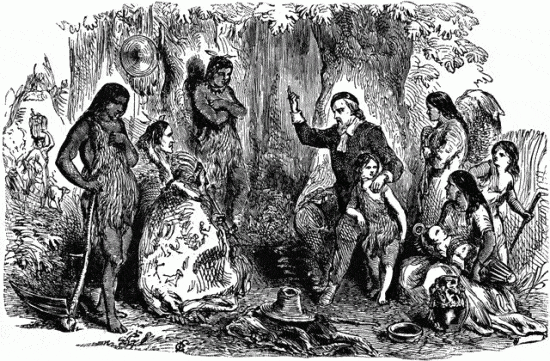Why They Came to the New World

The Buried story of the Pilgrims to New England
Troubled times do not give excuse to bury the original purpose which sent America’s founding Pilgrims to New England in the year 1620. Recently while vacationing in Plymouth, MA, my wife and I visited the Pilgrim Museum. While there we stumbled upon astounding facts expressed in the writings of these Pilgrims.
Excerpts from Pilgrim Edward Winslow’s 1624 Good Newes from New England:
To all…such as…desire to assist the people of Plymouth in their just proceedings, grace and peace be multiplied.
…there is no less hope of convincing the heathen of their evil ways, and converting them to the true knowledge and worship of the living God, and so consequently the salvation of their souls by the merits of Jesus Christ, than elsewhere…I therefore think it but my duty to offer the view of our proceedings…hoping that God hath wrought with us in our beginning of this worthy work, undertaken in his name and fear, so he will by us accomplish the same to his glory and our comfort, if we neglect not the means.
Pilgrim Robert Cushman helped arrange the Mayflower voyage in 1620 and came in the year 1621 to New England.
Excerpts from Edward Winslow’s 1622 Mourt’s Relations:
But some will say, what right have I to goe live in the heathen’s countrie? (New England)…seeing we daily pray for the conversion of the heathens, we must consider whether there be not some ordinary meanes and course for us to take to convert them, or whether praier for them be only referred to God’s extraordinarie work from heaven. Now it seemeth unto me that we ought also to endeavour and use the meanes to convert them, and the meanes cannot be used unless we goe to them…
Letter written by Robert Cushman
Excerpts from Frederick Lewis Weis’ New England Company of 1649 and its Missionary Enterprises, 1948:
For the grant of these charters (Plymouth and Massachusetts Bay Colonies) was, in fact, contingent upon the Christianizing of the Indians by the founders of New England.
The king expressly declared, in his grant to the Council of Plymouth in 1621, that “the principall effect which (he) can desire or expect of this action, is the conversion…of the people of those parts, unto the true worship of God and Christian religion.
Governor Edward Winslow and the people of Plymouth were strongly in sympathy with this goal. In his Brief(Mourt’s) Relation, printed in 1622, Governor Winslow declared that “for the conversion (of the natives) we intend to be as careful as of our own happiness…” Until his death in 1655 no one worked more persistently to this end than he did, and it was in large measure due to him that the New England Company of 1649 owed its establishment…

Pilgrim Edward Winslow’s words reveal the mission of the founding Pilgrims who were the “stepping stones” for us. In the midst of cold temperatures, starvation, sickness, and death of nearly fifty percent of the first Pilgrims; their hearts still burned with their purpose to get the Gospel to the lost Indians of New England. There were many obstacles to overcome. First, the Indians were bound in the dark ways of Satanic, pagan worship; from child sacrifices to cutting, painting, and injuring their own bodies in dedication to him. Second, there was a language barrier. Winslow was not fazed by difficult circumstances, the Indians’ lost ways, or the language barrier. He developed Christian relationships with the Indians by showing them God’s love and trying to converse with them. He also enlisted the help of Missionary John Eliot to translate the English Bible into the Indian language, and then went to England to petition Parliament for missionary funds to help propagate the Gospel to the Indians.
Excerpts from Pilgrim Edward Winslow’s 1624 Good Newes from New England:
A few things I thought meet to add hereunto, which I have observed amongst the Indians, both touching their religion and sundry other customs…The office and duty of the powah is to be exercised principally in calling upon the devil, and curing diseases of the sick or wounded…Many sacrifices the Indians use, and in some cases kill children…The pnieses are men…to those also the devil appeareth…and…maketh covenant with them…by wounds with arrows, knives, hatchets…all of them by painting disfigure themselves…they train up the most forward and likeliest boys, from their childhood…to make them hardy and acceptable to the devil…
As for the language, it is very copious, large, and difficult. As yet we cannot attain to any great measure thereof; but understanding, by the help of those that daily converse with us.
Excerpts from the 1920 New England Company of 1649 and John Eliot:
Governor Edward Winslow (agent for the Plymouth and Massachusetts Bay Colonies) returned to England and influenced Parliament to vote the passage of his “Act for the promoting and Propagating of the Gospel of Jesus Christ in New England.
Introduction, by George Parker Winship 1649
“Whereas the Commons of England assembled in Parliament have received certain intelligence, by the testimonials of divers faithful and godly Ministers, and others in New England, that divers the heathen natives of that country, through the blessing of God upon the pious care and pains of some godly English of this Nation, who preach the Gospel to them in their own Indian Language, who not onely of Barbarous are become Civil, but many of them forsaking their accustomed Charms and Sorceries, and other Satanical Delusions, do now call upon the Name of the Lord, and give great testimony of the power of God drawing them from death and darkness, into the life and light of the glorious Gospel of Jesus Christ…
…“Be it therefore enacted by this present Parliament, that for the furthering so good a work there shall be a Corporation in England…by the name of the President and Society for the Propagation of the Gospel in New England…”
Preamble, Act of Parliament on 27 July 1649
The discussion of the proposal to print the translation of the Indian Bible extended throughout the first decade of the Society.

Missionary John Eliot, friend of Edward Winslow, worked for 14 years on the Indian Bible translation using the English King James Version and Geneva Bible. The translation was completed in September 1663 and by 1664, it was reported that “upward of a thousand” Indian Bibles were printed in New England for the Indians with a press shipped over from England; the first non-English Bible printed in America. This printing press is housed today at Harvard University in Cambridge, Massachusetts.
Pilgrim Edward Winslow’s heart overflowed with joy when he received letters from Missionary John Eliot relating the salvation of the Indians. An excerpt of one follows:
Her life was blameless after she submitted to the Gospel, and was exemplary…She dyed of a sicknesse she took in childbed: I severall times visited her, prayed with her, asked her about her spirituall estate. She told me she still loved God, though he made her sick, and was resolved to pray unto him so long as she lived, and to refuse powwowing. She said also, that she believed God would pardon all her sins, because she believed that Jesus Christ dyed for her; and that God was well pleased in him, and that she was willing to dye, and believed to goe to Heaven, and live happy with God and Christ there.
After understanding these truths from America’s founding days, should we not continue fanning the Gospel flame started by these Pilgrim believers? The year 2021 still has great possibility for a Great Awakening in our United States of America.
“…and as one small candle may light a thousand, so the light here kindled has shone unto many.”
Governor William Bradford, Plymouth Plantation
